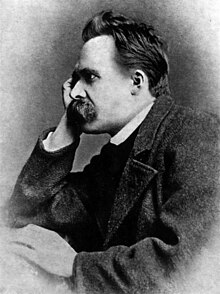Death of God theology
theological-philosophical movement explaining the rise of secularity and abandonment of traditional beliefs in God
Death of God theology is a theological movement in which the theological consequences of an absent God are explored.

Quotes
edit- Grundworte sagen nicht etwas aus, was außer ihnen bestünde, sondern gesprochen stiften sie einen Bestand.
- Basic words do not state something that might exist outside them; by being spoken they establish a mode of existence.
- Martin Buber, I and Thou (1923), p. 53
- Basic words do not state something that might exist outside them; by being spoken they establish a mode of existence.
- All names of God remain hallowed because they have been used not only to speak of God but also to speak to him.
- Martin Buber, I and Thou (1923), p. 123
- What if God did not have first to be, since he loved us first, when we were not? And what if, to envisage him, we did not have to wait for him within the horizon of Being, but rather transgress ourselves in risking to love love.
- Jean-Luc Marion, God Without Being (1982), p. 3
- "Will to truth" does not mean "I do not want to let myself be deceived" but—there is no alternative—"I will not deceive, not even myself"; and with that we stand on moral ground. . . . You will have gathered what I am getting at, namely, that it is still a metaphysical faith upon which our faith in science rests—that even we knowers of today, we godless anti-metaphysicians, still take our fire, too, from the flame lit by the thousand-year-old faith, the Christian faith which was also Plato's faith, that God is truth; that truth is divine.
- Friedrich Nietzsche, The Gay Science (1882), B. Williams, ed. (2001), § 344
- You see what it was that really triumphed over the Christian God: Christian morality itself, the concept of truthfulness that was understood more rigorously, the father confessor’s refinement of the Christian conscience, translated and sublimated into a scientific conscience, into intellectual cleanliness at any price.
- Friedrich Nietzsche, The Gay Science (1882), as translated by Walter Kaufmann, § 357